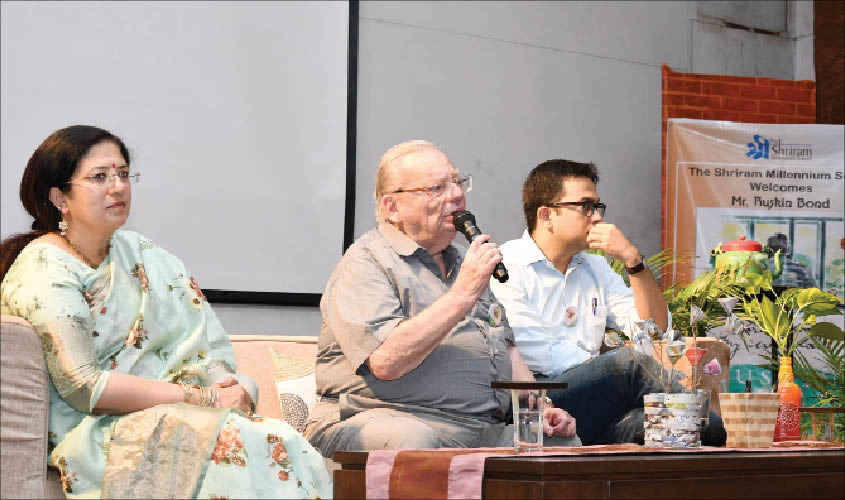Ruskin Bond’s latest, Words From My Window, is a meditation on memory, nature and childhood. Saumya Mehrotra writes about the new book and about Bond’s multigenerational readership.
“When I finished school, I promised myself that I will never visit any school from now on. But here I am! And my books have brought me here,” says Ruskin Bond, at a recent event, to mark the launch of his journal Words From My Window, held at the Shriram Millennium School in Noida on 31 July.
A Sahitya Akademi Award winner and bestselling author, Bond has written extensively and intelligently for young readers. He has written some remarkable stories for children, which, like the best specimens of children’s literature, go beyond restrictive generational appeal and are admired equally by grownups.
His narratives are often designed around young characters. Even his first novel, The Room on the Roof, published in 1956, revolves around the figure of a teenager. According to Bond, he owes a good part of his literary success and popularity to the children of this world. So it made complete sense for him to be launching his new book among schoolchildren. The author was repaying a debt of gratitude to his most devoted readers.
Words From My Window is a short, collaborative book of fragments. It includes prose pieces by Bond, as well as a series of watercolour illustrations by the British artist Dan Williams. Bond said that the watercolours capture the essence of his life and his work, and that the book belongs as much to him as it does to Williams.
After the book launch, Bond interacted with the audience, comprising students from different schools across Delhi-NCR.
A student of the Global International School, Delhi, asked the author, “Don’t you think that with the mass destruction of nature in the present scenario, your books will be a reminder in the future of how the earth looked 50 years ago?”
Bond, visibly impressed by the question, and by the awareness level of his questioner, replied, “I think if there are more young people like you, there is still hope for the world. You’re right, I think 20 years from now people might look at my books and realise that the world doesn’t look like that anymore. But it’s your future. You can move towards a better world and you have to.”
During the interaction, Bond recollected his school days in Mussorie and Darjeeling with great fondness. A hint of nostalgia crept into his voice. Words From My Window is also a book about memory.
The journal begins with these words: “In a way, this journal is an ode to my window, or rather, to all the windows I have possessed throughout my life; for without a window I doubt if I would have been half the writer that I am today.”
Bond’s journal is a curious combination of memoir and nature writing genres. He has written, for instance, about the little visitors at his window: the birds, the beetles and a tiny bat. Also, he writes about human lives observed from a distance. His subjects are often chosen from the ranks of ordinary people rather than the high and mighty, the forgotten everyday heroes—like Dhuki, who “spent most of his life growing sweet peas and petunias for an old lady… That’s the kind of life I try to celebrate!”
To appreciate the beauty all around us, one doesn’t have to be a poet. But Bond is a writer who looks at the world through a sensibility that is essentially poetic. The descriptions of the sky, rain and sunshine often attain the lyricism of a short poem.
The journal also touches upon Bond’s first encounter with loneliness, when he had to move to a boarding school at the age of seven. That was when his nature walks, books and his love of cinema helped him to be appreciate his own company, and that was when he began to realise that there is a difference between being alone and being lonely.
Some notes on the writing life also appear in these pages. The old Remington typewriter which Bond found in his stepfather’s automobile showroom, and often mentions in his books, gets a dedicated journal entry along with a watercolour painting. He tells us that the journal was influenced by the works of Somerset Maugham, Sterne’s A Sentimental Journey and the diaries of Samuel Pepys.
But the prime objective of this book was personal rather than literary. “So I knew the importance of a journal or diary from a literary point of view, but I also wanted to keep one in order to preserve the memory of my friends,” writes Bond.

